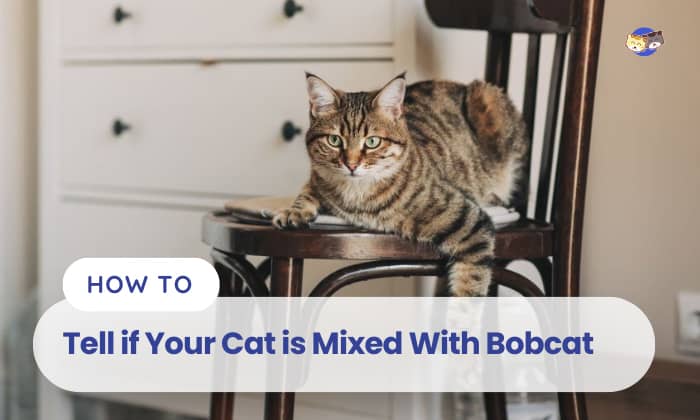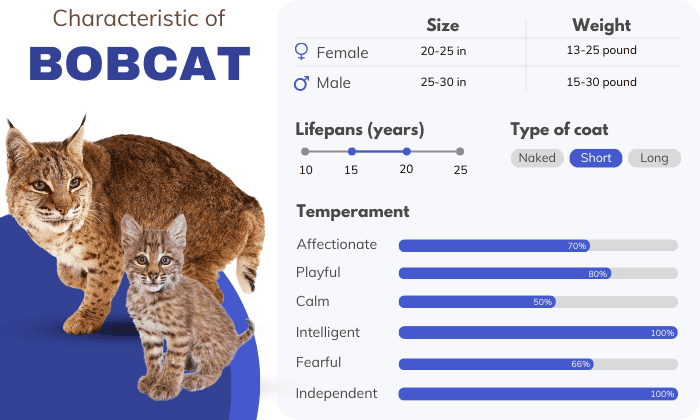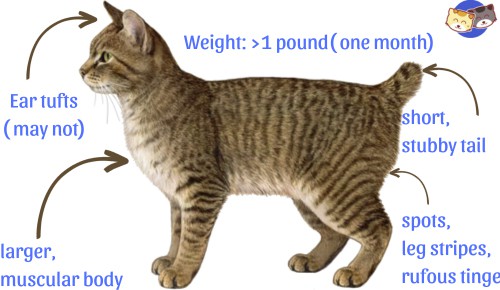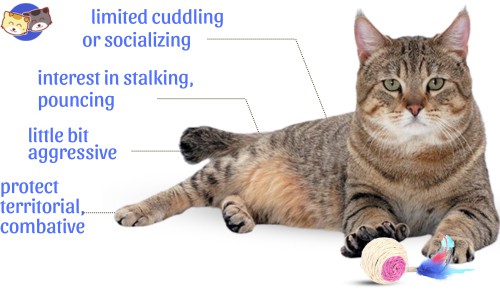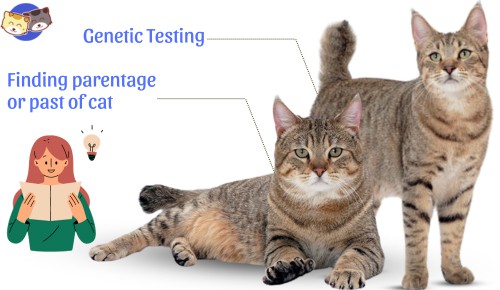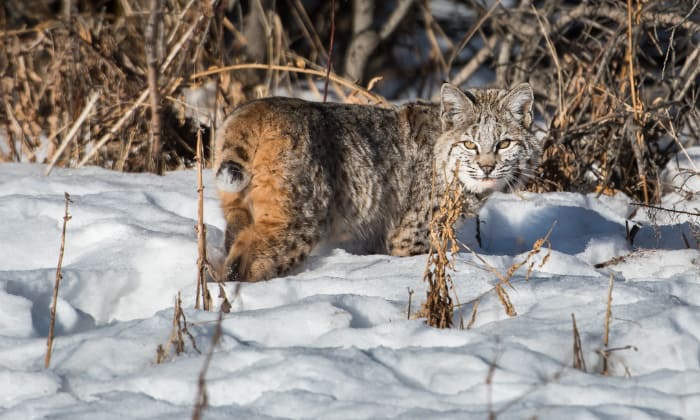You never know what surprises are around the corner when you explore the world of feline genetics; it’s like going on a mystery investigation!
One of these fascinating discoveries is the potential for domestic cats to have bobcat genes and exhibit an interesting fusion of traits.
Even though such incidents are uncommon, many cat owners want to know the subtle signs of their feline friend having a small amount of bobcat ancestry.
That is why, in this article, we will examine the physical attributes and distinctive personality traits that felines might inherit from their wildcat ancestors.
Here’s how to tell if your cat is mixed with bobcat.
Before we delve into further details, let us give you a quick overview of bobcats.
Table of Contents
Quick Overview: What is a Bobcat?
A bobcat (Lynx rufus) is a medium-sized wild cat native to North America. It belongs to the Lynx genus and is part of the Felidae family, which includes other cats such as domestic cats, lions, tigers, and other wildcat species.
These solitary and territorial creatures are known for their distinctive coat patterns, short “bobbed” tails with black tips, and tufts of fur on their ears.
Their diet includes small to medium-sized prey, making them crucial for ecosystem balance.
Though their population is generally stable, localized threats such as habitat loss and human activity can impact them.
There are purported times when bobcats mate with domestic cats, resulting in rare hybrid offspring exhibiting traits of both species.
1. Physical characteristics
Here are the physical characteristics to look out for in case there’s a possibility your house cat is mixed with a bobcat:
1, Size and Build
Bobcats are notably larger than domestic cats, with an average weight of around 13-30 pounds, including their tail.
If your cat exhibits a larger, more muscular build than typical domestic breeds and weighs more than one pound at one month of age, it may have bobcat lineage.
2, Coat Patterns
Bobcats are known for their distinctive coat patterns, which often include spots, leg stripes, and a rufous tinge.
If your cat’s coat features unusual markings that differ from the standard tabby or solid color patterns, it might indicate that your feline is mixed with a bobcat.
3, Tail Length and Appearance
One of the most recognizable features of a bobcat is its short, stubby tail with a black tip. If your feline companion has these features and a white patch on the underside of its tail, it may be a bobcat.
4, Ear Tufts
Bobcats possess ear tufts, which are small, pointed strands of hair at the tip of their ears. While domestic cats can also have ear tufts, their presence might be more prominent in a hybrid cat.
However, bobcat mix kittens might not have fully grown their tufts yet. Because of this, it could be a poor sign of determining whether your adorable kitten is a domestic cat or a bobcat.
2. Personality traits
Aside from having distinct physical characteristics, there are also personality traits that might show whether your precious feline fur bud is a half-bobcat half domestic cat:
1, Independence
Both domestic felines and bobcats are known for their independent nature. But if your cat displays an exceptionally strong desire for autonomy with a limited inclination toward cuddling or socializing, it could be indicative of its wild ancestry!
2, Agility and Hunting Instincts
Bobcats are skilled hunters. And unlike their domesticated feline cousins, they often swim to hunt and travel!
Also, if your feline buddy is engaging in high-energy play, displaying a keen interest in stalking and pouncing, and is a little bit on the aggressive side, it might have bobcat lineage!
3, Territorial Behavior
Bobcats are territorial creatures, and this trait might be inherited by their hybrid offspring. If your cat is particularly possessive of its space and exhibits combative behavior, it could be linked to its bobcat genes.
3. Other signs to look for
1, Genetic Testing
DNA testing is also a very reliable way to find out if your cat has bobcat genetics. There are several DNA tests available today that are tailored specifically for felines if you’re interested in learning more about your cat’s genetics!
2, Parentage and History
Nothing beats directly knowing your beloved feline friend’s history. If you can dig up anything about the parentage or past of your cat, such as its parents are bobcat crossed with a domestic cat, it could also offer important hints.
The Truth Behind the So-called Bobcat Hybrids
While some people might believe that breeding a domestic cat with a bobcat is a terrific way to create a hybrid feline, surprisingly, despite their similar appearances and certain shared traits, domestic cats and bobcats/lynxes don’t really mate.
It is extremely rare and unlikely to occur naturally in the wild. Lynxes (genus Lynx) and domestic cats (Felis silvestris catus) don’t frequent the same spots, and bobcats are more likely to eat house cats than mate with them.
Although there have been reports and anecdotal claims that a bobcat or a lynx breeds with a domestic cat, there aren’t mixed-hybrid bobcats, despite what some rumors claim. There is no scientific evidence to support this possibility.
Conclusion
Having kittens that are a blend of bobcat and domestic cat, or even a hybrid between a bobcat and a wild cat, truly introduces an element of fascination to the realm of feline companionship!
In this article, we have provided you with a list of things on how to tell if your cat is mixed with bobcat, from physical characteristics such as your cat’s coat patterns, size, etc., to its unique personality traits!
But in the end, the existence of so-called bobcat hybrids has not been proven by any scientific evidence.
But don’t fret, dear fur parent! Although there are no domestic cat breeds known to have Bobcat DNA, there are several unique and exotic-looking cat breeds that make wonderful feline companions, like the Bengal cats, European short hair, and even Norwegian forest cats!

I am Amy Sawy, a Doctor of Veterinary Medicine (DVM) graduate from the University of Kansas. y husband, Dr. Plummer, and I own a veterinary clinic in Phillipsburg, Kansas. In addition to my professional background, I am a devoted pet owner myself, with a household that includes dogs, rodents, and most notably, cats – a total of five felines in my home.
In 2020, I joined an organization as a professional writer, leveraging my experience and collaborating with my team to deliver the most valuable information for your cat’s care.


